Unit9
人教版(新目标)初中英语九年级下册Unit 9 自学知识点
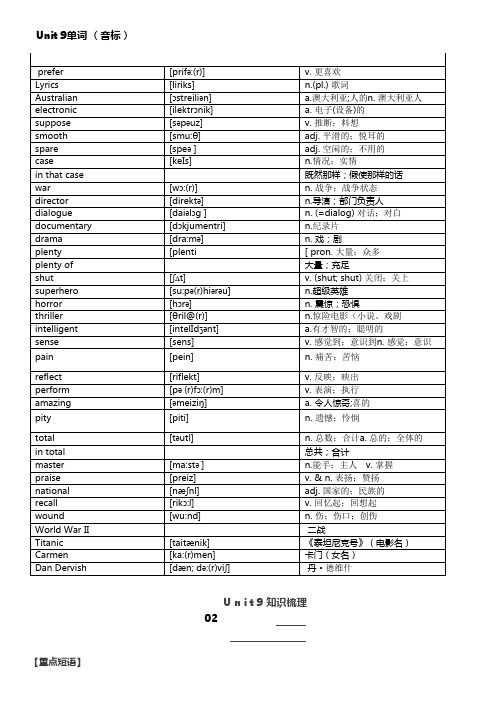
Unit 9单词(音标)U n i t 9 知识梳理02【重点短语】1.dance to (music) 随着(音乐)跳舞2.sing along with 随着…一起唱3.musicians who play different kinds of music弹奏不同类型音乐的音乐家4.electronic music 电子音乐5.not much 没什么(事)6.suppose sb to do sth. 猜想某人做某事7.be supposed to do sth 应该做某事8.suppose sb (to be) +adj. 原以为…9.have spare time 有空闲时间10.in one’s spare time在某人的空闲时间11.spare the time to do sth 抽时间做…12.a film director 一名电影导演13.think too much 想太多14.in that case 既然那样15.World War II 第二次世界大战16.smooth music 悦耳的音乐17.prefer A to B 比起B来更喜欢A18.prefer doing A to doing B19.prefer to do sth. rather than do sth.20.feel like doing sth 想要做某事21.stick to 坚持,固守22.be down 悲哀,沮丧23.cheer sb up 使… 高兴/ 振奋24.have a happy ending 有个美满的结局25.try one’s best to do sth. 尽某人最大努力做…26.less serious 不那么严重27.a good way to do sth 做某事的好办法28.make me feel even sadder 让我感觉更伤心29.provide plenty of information about a certain subject 提供了大量的关于某个主题的信息30.shut off my brain 关闭我的大脑【重点句型】1.I love singers who write their own music.我喜欢自己创作曲子的歌手。
人教版初一Unit 9 课文讲解-讲义(学生版)

Unit 9 课文讲解一、课堂目标1. 学习并积累单词;2. 学会用英语描述最喜欢的学科;3. 能读懂有关描述学校课程安排及课程喜好的短文;4. 学习特殊疑问句。
二、课前热身1. 复习写出下列基数词对应的序数词:① one → ② two → ③ three → ④ four → ⑤ five → ⑥ six → ⑦ seven → ⑧ eight →⑨ nine → ⑩ ten → ⑪ twenty →⑫ twelve →英汉互译(1)when 意为,对时间进行提问;(2)old 表示“年老的”,其反义词为;(3)“举行聚会”:;(4)“通过考试”:;(5)go for a trip:;(6)dear 除了表示“亲爱的”,还可以表示;(7)忙于做某事:;(8)It’s time to do sth. :。
2. 认识单词favoriteadj.特别喜爱的subject n.学科;科目n.特别喜爱的人或事物math n.(=maths)数学subject n.学科;科目history n.历史P. E.n.体育because conj.因为musicn.音乐;乐曲Friday n.星期五Chinesen.语文;汉语cool adj.妙极的;酷的adj.汉语的;中国的Wednesday n.星期三geography n.地理(学)Sunday n.星期日why adv.为什么P. M. 下午;午后Monday n.星期一lesson n.课;一节课Saturday n.星期六useful adj.有用的;有益的free adj.空闲的from prep.从...... 开始Tuesday n.星期二Mrs. 太太;夫人Thursday n.星期四finish v.完成;做好A. M.上午hourn.小时短语:① for sure 无疑;肯定 ② from ... to ... 从...... 到......三、课文讲解一1. 课文朗读2. 重难点讲解How's your day?How's your day? 是非正式场合朋友见面时的问候语。
Unit9 知识要点
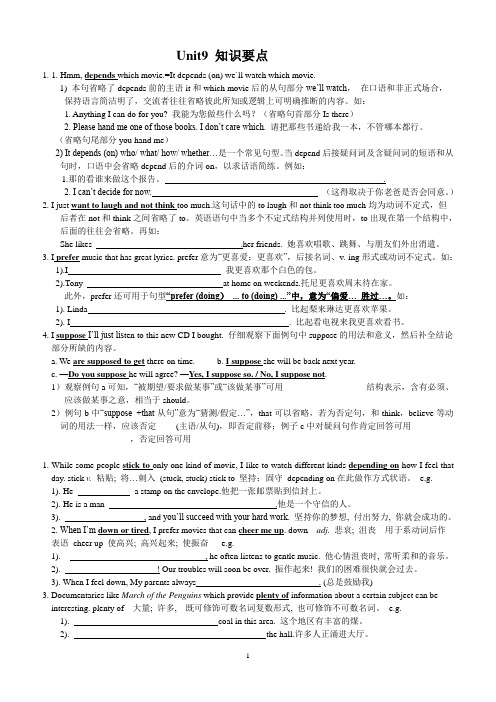
Unit9 知识要点1.1. Hmm, depends which movie.=It depends (on) we`ll watch which movie.1) 本句省略了depends前的主语it和which movie后的从句部分we’ll watch,在口语和非正式场合,保持语言简洁明了,交流者往往省略彼此所知或逻辑上可明确推断的内容。
如:1. Anything I can do for you? 我能为您做些什么吗?(省略句首部分Is there)2. Please hand me one of those books. I don’t care which. 请把那些书递给我一本,不管哪本都行。
(省略句尾部分you hand me)2) It depends (on) who/ what/ how/ whether…是一个常见句型。
当depend后接疑问词及含疑问词的短语和从句时,口语中会省略depend后的介词on,以求话语简练。
例如:1.那的看谁来做这个报告。
.2. I can’t decide for now.(这得取决于你老爸是否会同意。
)2. I just want to laugh and not think too much.这句话中的to laugh和not think too much均为动词不定式,但后者在not和think之间省略了to。
英语语句中当多个不定式结构并列使用时,to出现在第一个结构中,后面的往往会省略。
再如:She likes .her friends. 她喜欢唱歌、跳舞、与朋友们外出消遣。
3. I prefer music that has great lyrics. prefer意为“更喜爱;更喜欢”,后接名词、v.-ing形式或动词不定式。
如:1).I 我更喜欢那个白色的包。
2).Tony at home on weekends.托尼更喜欢周末待在家。
九年级英语Unit9 知识点
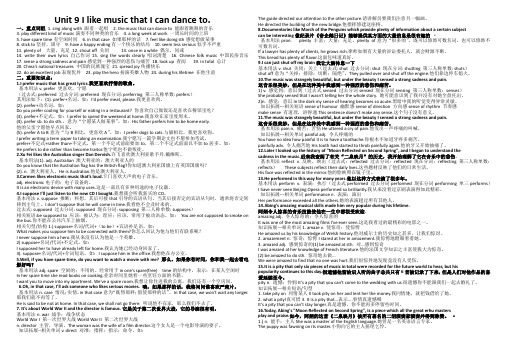
Unit 9 I like music that I can dance to.一、重点词组1. sing along with 跟着一起唱 2. the music that can dance to 能跟着跳舞的音乐3. play different kind of music演奏不同种类的音乐4. a long week at work 一周长时间的上班5. have spare time有空闲时间6. in that case 如果那样的话7. feel like doing sth感觉想做某事8. stick to坚持,固守9. have a happy ending有一个快乐的结局10. seem less serious似乎不严重11. plenty of 大量,充足12. shout off 关闭13. once in a while 偶尔,间或14. write their own lyrics 自己作词15. sing the words clearly 唱词清楚16. Chinese folk music 中国民俗音乐17. sense a strong sadness and pain感觉到一种强烈的悲伤与痛苦18. look up 查阅19. in total 总计20. China’s national treasures 中国的民族瑰宝21. spread joy传播快乐22. do an excellent job表现优异23. play the hero扮演英雄人物24. during his lifetime 在他生前二。
重要知识点:1.I prefer music that has great lyrics.我更喜欢抒情的歌曲。
基本用法v. prefer 更喜欢,宁愿(过去式: preferred 过去分词: preferred 现在分词: preferring 第三人称单数: prefers)其用法如下:(1). prefer+名词。
九年级英语单词表Unit9

九年级英语单词表Unit9九年级英语单词表Unit9Unit9inventv.发明;创造calculatorn.计算器beusedfor用来做……scoopv.&n.用勺舀;勺子;球形勺;长柄勺adjustableadj.可调整的`heeln.(鞋、袜等的)后跟;(足)跟batteryn.电池operatev.操作;作业battery-operated电池供电的slippern.拖鞋heatv.加热;使变热bulbn.电灯泡;电灯lightbulb电灯泡;电灯microwaven.微波microwaveoven微波炉crispyadj.脆的;易碎的saltyadj.咸的;含盐的souradj.酸的;酸味的bymistake错误地chefn.厨师sprinklev.撒(粉末状物);酒(液体)byaccident偶然地;意外地beveragen.饮料accordingto根据;按照;据……所说;视……为定ancientadj.古代的;古老的legendn.传说;传奇故事ShenNong神农(中国上古传说中农业、医药之祖,教人农耕,亲尝百草)bushn.灌木;灌木丛fallinto落入;陷入remainv.留下;被遗留;剩余;保持不变noticev.注意到;擦觉到producev.生产;制造;产生pleasantadj.合意的;令人愉快的;讨人喜欢的mixturen.混合;混合物;混合剂inthisway这样pien.馅饼flyingdisk飞碟;飞盘bakeryn.面包店Bridgeport(美国康涅狄格州西南部港市)布里奇波特Connecticut(美国)康涅狄格州throwv.投;掷tasten.味道;风味lemonn.柠檬cookien.小甜饼干;曲奇饼abacusn.算盘binocularsn.双筒望远镜centuryn.世纪;百年rankn.顺序;级别activeadj.活动的;活泼的;积极的indoorsadv.在户内createv.创造;创作;创建woodenadj.木制的knockv.敲;击;碰撞knockinto与……相撞dividev.分开;划分aimn.目标;目的basketn.篮;篮筐metaln.金属hoopn.环;圈;篮圈shootv.投篮;射击belowprep.&adv.在……的下面;低于……backboardn.篮板;背板guidev.指导;带领towardsprep.向着;朝着courtn.球场Berlin柏林developv.(使)发展;(使)成长;(使)发达popularityn.普及;流行risenv.rise的过去分词worldwideadv.&adj.世界范围的;世界性的associationn.协会equipmentn.装备;器材ChelseaLanmon切尔西?莱蒙JayceCoziar杰斯?克里亚JamieEllsworth杰米?埃尔斯沃思JulieThompson朱莉?汤普森Crum克拉姆(姓氏)JamesNaismith詹姆斯?奈史密斯(篮球运动创始人)。
Unit 9 单词讲解 -人教版九年级英语
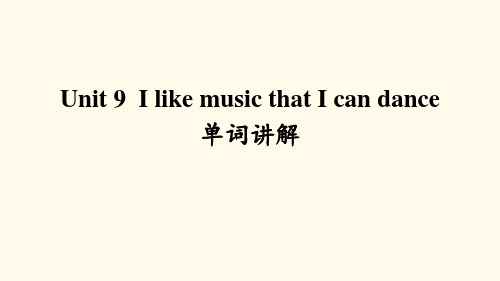
构成:
plenty
plenty of 大量;充足 (既可以 修饰可数名词,又可以修饰不可
[ˈplentɪ]
数名词,相当于lots of或 a lot of
),常用于肯定句中
pron. 大量;众多
例句:
In the summer,plenty of tourist
from all over the world come
down
[daʊn]
adj. 悲哀的;沮丧的 adv./prep.沿着
拓展:
let down 使...失望 put down 放下 cut down 砍倒 slow down 减缓;放慢 sit down 坐下 write down 写下 turn down 把声音调小
ending
[ˈendɪŋ]
case
[keɪs]
n. 情况;实情 ; 箱子
搭配: in case 后接从句;“以防;万一” in case of +单词“若某事发生;假如” in that case 既然那样;假使那样的话 in this case 在这种情况下 in any case 无论如何;不管怎样
例句: In that case, I won’t take that job.
pity
拓展: pity, shame “可惜
[ˈpɪti]
n. 遗憾;怜悯;
1.两者均可表示“遗憾的事”, 可以换用 2.shame还可以表示“可耻之事;
同情;可惜的事; 憾事
令人难堪的事”,指说话人对某
种行为感到厌烦,憎恶或讨厌; 而pity没有这一意思。 3.It is a pity that +从句 “真遗 憾......” What a pity! 真可以
九年级英语Unit9全单元课件
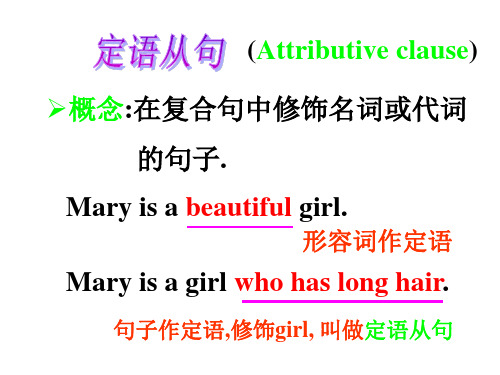
TF TF
3. Carmen likes electronic music that’s loud. T
4. Xu Fei prefers groups that play quiet T F and slow songs.
2b
Carmen says
1,I really love Dan Dervish. I like
10. 清晰的唱出歌词 sing the words clearly
prefer
1.prefer+n.
e.g. I prefer groups that play quiet and gentle songs 2.Prefer sth to sth 比…更喜欢…. e.g. I prefer____ (walk) to running. 3.Prefer to do sth 宁愿做某事 She prefers ____(be) alone at home.
I prefer music that has great lyrics.
I like music that isn’t too loud.
I love music that I can sing along with.
I like music that I can dance to.
1a Look at the picture and circle the sentences you agree with.Then write your own sentence.
4.prefer to do rather than do
She prefers to stay at home rather
Than____(go) shopping.
九年级英语上册第九单元词汇Unit9

九年级英语上册第九单元词汇Unit9Unit 9词汇篇重点词组1. sing along with 跟着⼀起唱2. the music that can dance to 能跟着跳舞的⾳乐3. play different kind of music演奏不同种类的⾳乐4. a long week at work ⼀周长时间的上班5. have spare time有空闲时间6. in that case 如果那样的话7. feel like doing sth感觉想做某事8. stick to坚持,固守9. have a happy ending有⼀个快乐的结局10. seem less serious似乎不严重11. plenty of ⼤量,充⾜12. shout off 关闭13. once in a while 偶尔,间或14. write their own lyrics ⾃⼰作词15. sing the words clearly 唱词清楚16. Chinese folk music 中国民俗⾳乐17. sense a strong sadness and pain感觉到⼀种强烈的悲伤与痛苦18. look up 查阅19. in total 总计20. China’s national treasures 中国的民族瑰宝21. spread joy传播快乐22. do an excellent job表现优异23. play the hero扮演英雄⼈物24. during his lifetime 在他⽣前语⾔知识点1. Hmm, depends which movie.1) 本句省略了depends前的主语it和which movie后的从句部分we’ll watch,这是典型的⼝语表达形式。
在⼝语和⾮正式场合,为保持语⾔简洁明了,交流者往往会省略彼此所知或逻辑上可明确推断的内容。
- 1、下载文档前请自行甄别文档内容的完整性,平台不提供额外的编辑、内容补充、找答案等附加服务。
- 2、"仅部分预览"的文档,不可在线预览部分如存在完整性等问题,可反馈申请退款(可完整预览的文档不适用该条件!)。
- 3、如文档侵犯您的权益,请联系客服反馈,我们会尽快为您处理(人工客服工作时间:9:00-18:30)。
He commutes from the suburbs to the city
center everyday.
He commutes between the suburbs and the
city center everyday.
Being unable to interpret the situations in which they find themselves, people often believe they are being …
be faced with —— 面对
e.g.
We are faced with serious environmental
problems.
commute —— v. travel regularly a long distance
between one’s home and work, esp. by train 通勤 e.g.
Cf: reliant: a. depending on 依赖的;信赖的
e.g.
We should not be reliant on military power alone.
He suddenly finds that much of what he has learned about interpreting the actions of people around him is suddenly irrelevant. The basic syntactic structure of the object clause in the sentence is much of what-clause is suddenly irrelevant where the what-clause is the post-modifier of the subject much. Similarly, you could find the same structure in the following sentence. e.g.
e.g.
You should not have deceived him. He is just
a child.
exploit —— v. 1)to use unfairly for one’s own profit 谋私利,剥削 2)to use or develop (a thing)fully so as to get profit 利用, 开发 e.g.
Unit One Unit Nine
Welcoming
Culture Shock
irrelevant —— a. not having any real connection with or relation to something else 不相干的;离题的 irrelevant to sth.
I can’t do the impossible. The rich is obliged to help the poor.
If not impossible is an elliptical(省略的) clause, with the subject part distinguishing between … and … left out to avoid repetition.
Much of what he said is not true.
Even distinguishing between the significant and the insignificant in a given situation becomes difficult, if not impossible. distinguish (from, between): v. see, hear, recognize, understand well the difference
… find themselves in the situations
find oneself + 介词短语 / 现在(过去)分词短语
When he came to, he found himself in a strange room / lying in hospital / surrounded by strangers.
Even distinguishing between the significant and the insignificant in a given situation becomes difficult, if not impossible. distinguished: a. famous, well known; remarkable
辨别;区别
It’s very important for students to learn to distinguish between the good and the bad. It’s very important for students to learn to distinguish the good from the bad.
卓越 for… / be distinguished as…
以…而著名
He is distinguished for his knowledge of politics
and law.
He is distinguished as a doctor.
Even distinguishing between the significant and the insignificant in a given situation becomes difficult, if not impossible.
He uses strategy to get what he wants.
strategy for doing sth.
The government have to develop a strategy for dealing with unemployment.
It’s all part of an overall strategy to gain promotion.
…distinguishing between … and … becomes difficult.
The significant and the insignificant are two noun phrases formed by the +adjective.
Even distinguishing between the significant and the insignificant in a given situation becomes difficult, if not impossible. In English, it is common to change an adjective into a noun when the definite article is added before the adjective.
impact —— n. strong impression or effect 影响
e.g.
The new policy has some impact on the laidoff workers.
in short —— 简言之
e.g.
She was surrounded by doctors, lawyers,
housewives — people, in short, like herself.
shock —— n. something unexpected and usu. very unpleasant 震惊;打击 v. cause unpleasant or angry surprise 震惊
e.g.
Cf: distinguished / distinctive:
非凡的;卓越的
有区别的;有特色的
She always wears distinctive clothes.
Even distinguishing between the significant and the insignificant in a given situation becomes difficult, if not impossible. The basic sentence structure is:
Illegally parked vehicles will be removed. Three children were removed from the school for persistent bad behavior.
removal n. Clearance of the site required the removal of a number of trees.
She is competent in her academic research. She is competent for the job. (She is qualified for the job.) She is competent at drawing. She did a competent job.
culture shock
I was shocked at his strange idea.
The terrorist attack shocked the whole world.
Culture shock is the result to the removal of
the familiar. remove v. = (written) to take sth./sb. away from a place (remove sth./sth. from sth./sb.)
